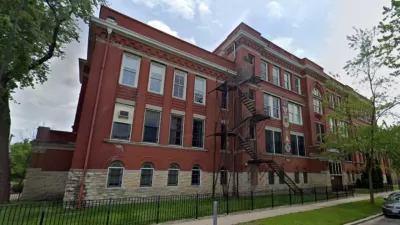Why would Whole Foods—a company colloquially known as "Whole Paycheck" and as a staple of wealthy neighborhoods—open an 18,000-square-foot location in one of the most impoverished parts of Chicago?
According to Emily Badger, "last year, to the disbelief of many, [Whole Foods] announced plans to open a store in 2016 here [in Englewood], in one of Chicago’s most economically depressed neighborhoods."
Reasonable people might assume that the store's opening is a sign of Englewood's eventual gentrification. According to the article, however, "that is not likely to happen in Englewood, at least not any time soon. Whole Foods is planning to sell olive oil and snap peas to the people who live here now. It is also planning, in the process, to make money."
Badger goes on to describe a bit more about the neighborhood's past, present, and the strategic decision to site the Whole Foods market in the hopes of catalyzing the future of the neighborhood. The plan for the development, for instance, includes the help of an urban farm a mile-and-a-half away, run by a nonprofit group called Growing Home.
FULL STORY: Why Whole Foods is moving into one of the poorest neighborhoods in Chicago

Planetizen Federal Action Tracker
A weekly monitor of how Trump’s orders and actions are impacting planners and planning in America.

Congressman Proposes Bill to Rename DC Metro “Trump Train”
The Make Autorail Great Again Act would withhold federal funding to the system until the Washington Metropolitan Area Transit Authority (WMATA), rebrands as the Washington Metropolitan Authority for Greater Access (WMAGA).

The Simple Legislative Tool Transforming Vacant Downtowns
In California, Michigan and Georgia, an easy win is bringing dollars — and delight — back to city centers.

The States Losing Rural Delivery Rooms at an Alarming Pace
In some states, as few as 9% of rural hospitals still deliver babies. As a result, rising pre-term births, no adequate pre-term care and "harrowing" close calls are a growing reality.

The Small South Asian Republic Going all in on EVs
Thanks to one simple policy change less than five years ago, 65% of new cars in this Himalayan country are now electric.

DC Backpedals on Bike Lane Protection, Swaps Barriers for Paint
Citing aesthetic concerns, the city is removing the concrete barriers and flexposts that once separated Arizona Avenue cyclists from motor vehicles.
Urban Design for Planners 1: Software Tools
This six-course series explores essential urban design concepts using open source software and equips planners with the tools they need to participate fully in the urban design process.
Planning for Universal Design
Learn the tools for implementing Universal Design in planning regulations.
Smith Gee Studio
City of Charlotte
City of Camden Redevelopment Agency
City of Astoria
Transportation Research & Education Center (TREC) at Portland State University
US High Speed Rail Association
City of Camden Redevelopment Agency
Municipality of Princeton (NJ)



























